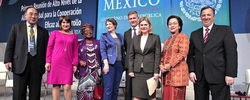 April 24, 2014 The Prime Minister of the United Kingdom, David Cameron, organised his fourth Easter reception at Downing street 10. In an article in the Church Times, Cameron characterised the UK as a Christian Nation and explicitly embraced the Church as a partner of the state, because of their addressing of some of the pressing problems of society We see our churches as vital partners. If we pull together, we can change the world and make it a better place. We can recognise this flirt of the State with the Church from the history of the Roman Empire. Constantine persecuted Christians at first, but later he turned to the Church in recognition of its organisational qualities. These qualities made the church an important partner in governance and was useful for providing stability in the Roman Empire. Public support for the Church Whether Cameron's reaffirmation of the role of the Church for welfare programs and other social projects should be feared or praised remains to be seen. It certainly is a clear recognition to role the Church has always had in social welfare for both Christians and non-Christians. Should it, however, receive public support of the type Cameron provides? Over 20 million pound sterling has been given to the Church for maintenance of Cathedrals and 8 million to support the Near Neighbours programme of the Church. Not for no reason his article in the Church Times, entitled "My faith in the Church of England", is echoed today in The Telegraph. Separation of Church and State The deputy Prime Minister, Nick Clegg, would rather have the Queen giving up on her title of Defender of the Faith and Supreme Governor of the Church of England, which she inherited from Henry VIII who broke with the Roman Catholic Church in 1534. Despite being a Christian myself, I would rather support Clegg than Cameron in his plight. I also share to quite an extent the criticism that was expressed by 50 prominent humanists, atheists and secular scholars in a letter to The Telegraph: "We are a plural society with citizens with a range of perspectives, and we are a largely non-religious society. Constantly to claim otherwise fosters alienation and division in our society. Although it is right to recognise the contribution made by many Christians to social action, it is wrong to try to exceptionalise their contribution when it is equalled by British people of different beliefs." While it may be taken into consideration that many communities from religions other than Christianity have indicated that they have no problems with Cameron calling the UK a Christian nation, his explicit referencing to the Church as a vital partner of the State should be met with some healthy suspicion.
0.7% for welfare or trade The achievements of the British government to keep to the 0.7%-target of Gross National Income for foreign aid and to do something about modern slavery may be noticed. However, it would be wrong to link this to the Christian tradition only, like Cameron did. Organisations like Oxfam and Save the Children have been at the forefront of this fight. At the same time it should be noticed that, for instance, the UK Trade and Investment office is a firm supporter of increased levels of humanitarian aid, given their prominent place at the annual AidEx in Brussels. Power dynamics Both the Old and New Testament bear witness to the reality of answerability from earthly kings to Divine power, independent from the religious convictions of their people. This is a reality in many faith systems. At the same time some biblical kings made serious efforts of cleansing the land from idols and returning to God, who they recognised as creator of heaven and earth. If the latter is Cameron’s objective, I would warmheartedly support him. However, he does not need the Church as an institution to help him do that and he may find unorthodox friends at his side among humanists and activists who also wish to take better care of this planet. Church to save the State The Church should not be called in to save a failing welfare state and make up for its shortcomings in providing for its citizens. Neither should a political leader try to win popular votes by paying visits to churches (like Asad did in Syria or like Putin last year in Ukraine). The Church in turn should not be willing to accept public support for taking up a social welfare role. Christians should rather continue to be witnesses of Christ and show Gods sacrificial love to kings and commoners, following the example set by the founder of their faith, Jesus Christ. Such love surpasses divisions based on political affiliation, ethnicity, sexual orientation or religions and accepts everyone as unique human beings, created in the image of God. Showing such a love would really bring heaven on earth. I guess there are still many lessons to learn for both the State and the Church.  April 15-16, 2014 Two days the High Level Panel participants needed to set the stage for development cooperation 2.0 where not only governments will drive the agenda but also the private sector has explicitly been invited to join hands with the state in striving for an inclusive development agenda. However, a chinese entrepreneur made it clear right from the start that she had no altruistic intentions as the sole interest for her shoe factory to invest in Ethiopia were the low wages and related higher margins that she could obtain. She pointed to the fact that the wages were ten times lower than the wages in China. Accountability This led to others pointing to the need to build structures for local accountability with involvement of civil society and parliament. The out-going co-chair Justine Greening of DFID was applauded for her role in bringing so many private sector parties on board. Possibly her successor Lilianne Ploumen (Dutch Secretary of State for Aid and Trade) may shift the focus to the role of parliaments and civil society as important facilitators for an accountable and responsible private sector development. A number of strategic partnerships with Dutch CSOs are already piloted in the Horn of Africa and the Great Lakes region. Lessons learnt will probably feed into the post 2015 era where cooperation with civil society will take a rather different shape from the current contract management approach.  Still he is able to mobilise the masses. At least in Groningen, the Netherlands, where this week The Passion again is staged. A powerful message about a seemingly powerless king. How will todays leaders be inspired by the kind of leadership that Jesus Christ displayed on the cross. A week to consider once again the power of faith beyond reason. Sometimes I do wonder whether all our getting together at the global level trying to solve the worlds problems in big gatherings could embrace another roadmap. One of self-sacrifice rather then self-interest. Pouring out oneself for many. If only a few of the super rich would do so. Still I belief it is not the material gift that makes the difference, it is the belief in someone's capabilities for transformational change.  Looking forward to the upcoming High Level Meeting on Effective Development Cooperation in Mexico I read through the documents that will mostly determine the talk of the day during those deliberations. As much as I am aware that Mexico is rather a follow-up to Paris, Accra and Busan in a search for effective development strategies, I also see a break away from an NGO-led poverty focus towards a Private-Sector led sustainability focus. So what effectiveness will we be talking about in Mexico? Doing my preparatory reading for session 5 of this meeting I read the following statement: "Smarter financial partnerships between private corporate and financial entities, development assistance providers, and foundations are creating new opportunities for scaling up development finance. By providing for sound financial return so as to maximize social impact, these partnerships are transforming the prevailing paradigm to a private-sector–led model, and thereby accelerating the progress and impact of development finance." So what is effectiveness about? Smart partnerships between money, money and money that should show a tremendous increase in development financing hence solving the global development crises. However, this idea much resembles the post-war 'financial push' paradigm. It did bring welfare to Europe, but did it bring sustainability?
Last week the UN gathered in a 10th session preparing for the post 2015 agenda and I am sure next week will feed into that process as well, though they are seperately organised. My recommendation for a truly private-sector led developent agenda would be to have only the private sector actors sitting with themselves (not in partnership with public agencies or civil society) taking the Sustainable Development Goals as they develop in the UN and design a theory of change that will transform its own profit premise into a value premise and come up with smart indicators that will help all other players (public agencies and NGOs) to keep them to account. Would that not bring true sustainable development? There is but one thing. Make sure the whole private sector is on board. Tripartite agreements Next week I won't be in Mexico but will spend time in the Horn of Africa instead figuring out how Self-Help Groups may be part of the answer in addressing the protracted crisis of resource conflicts that characterises this region. One of the items on the agenda is partnerships. How to effectively connect to public agencies and private sector operators. However, after having embraced each other so firmly, I wonder if the public-private partnerships advocated for in Mexico, can be effectively turned into a tripartite agreement that includes people. Wishing all dignatories a very effective High-Level Meeting in Mexico, hoping that they will acknowledge the importance of people for making partnerships work. The Open Working Group on Development Effectiveness is in its 10th session this week. It is an important momentum, since the First High-Level Meeting of the Global Partnership for Effective Development Co-operation is also due to take place in Mexico later this month. It was interesting to find that the Netherlands, the United Kingdom and Australia apparently have found each other, preparing a joint statement as input towards the open working group. Already for some time the Dutch seem to follow closely what is happening in Australia and for years the agenda of Dutch policy makers has been fed by developments in the UK. What makes the Dutch falling in love with the Australian part of the Commonwealth. Its proximity to the Pacific may be but one reason. Another reason could be found in the way the Australian government has chosen to position its international development agenda and who is driving it. The content of the statement (just a one-pager) should point to what brings these pragmatist together. They are embracing a Results Based approach linked to clear outcomes in 2030 and all of them are in favour of a stronger role for the private sector in achieving those outcomes. From dairy to food An example of market-driven development that seems to gain momentum in this Trade for Aid agenda is The London Dairy Exchange (see youtube link below), not surprisingly having its base in 'The City'. The tool obviously revolutionizes market access bringing the principles of trading to the doorstep of any intermediate or farmer clever enough to handle the database. Because again it is all about data and connectivity. Recently the TLDE joined forces with Mask-Africa expanding their sole focus on dairy to include food crops in Africa launching the African Food Exchange. Is this something Justine Greening (Secretary of State for International Cooperation of the UK) and here fellow ministers from Nigeria and Indonesia are aiming to promote at the upcoming High-Level Meeting in Mexico. As already discussed at a side meeting in Abuja preparing for the Mexico gathering later this year business continues its storming entrance in the global development arena and the for-profits seem to outnumber the not-for-profits for the first time. It will be a major theme and market mechanisms like the Africa Food Exchange may try their luck. Interests Is the next bubble in the making? Is this agenda driven by traders in The City looking to hedge new margins or is this to be a truly inclusive mechanism that provides access to markets for millions of small-holders? Are economies of scale in the interest of the small-holder or in the interest of investors who see new horizons in the investment market? Do we really talk about a level playing field? To be continued... |
About meMy name is Reinier van Hoffen. U®Reading
Click here for a summary.
Also find the text of a lecture Dr. Achterhuis held at the 2012 Bilderberg conference. Archives
August 2022
|
AddressNachtegaallaan 26
Ede, the Netherlands |
Telephone+31 (0)6 1429 1569
|
info@uraide.nl
|
 RSS Feed
RSS Feed
















